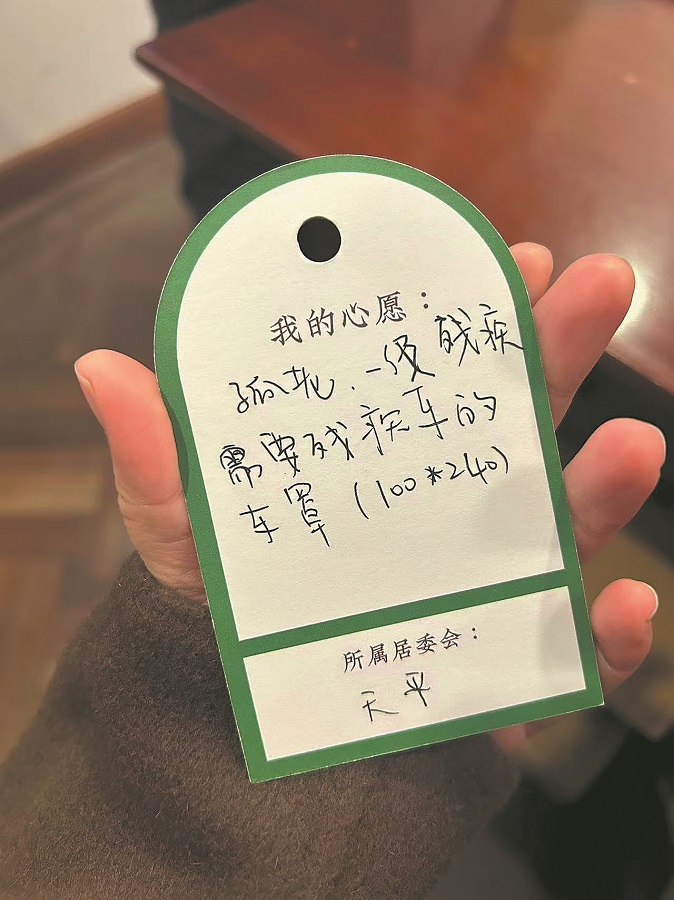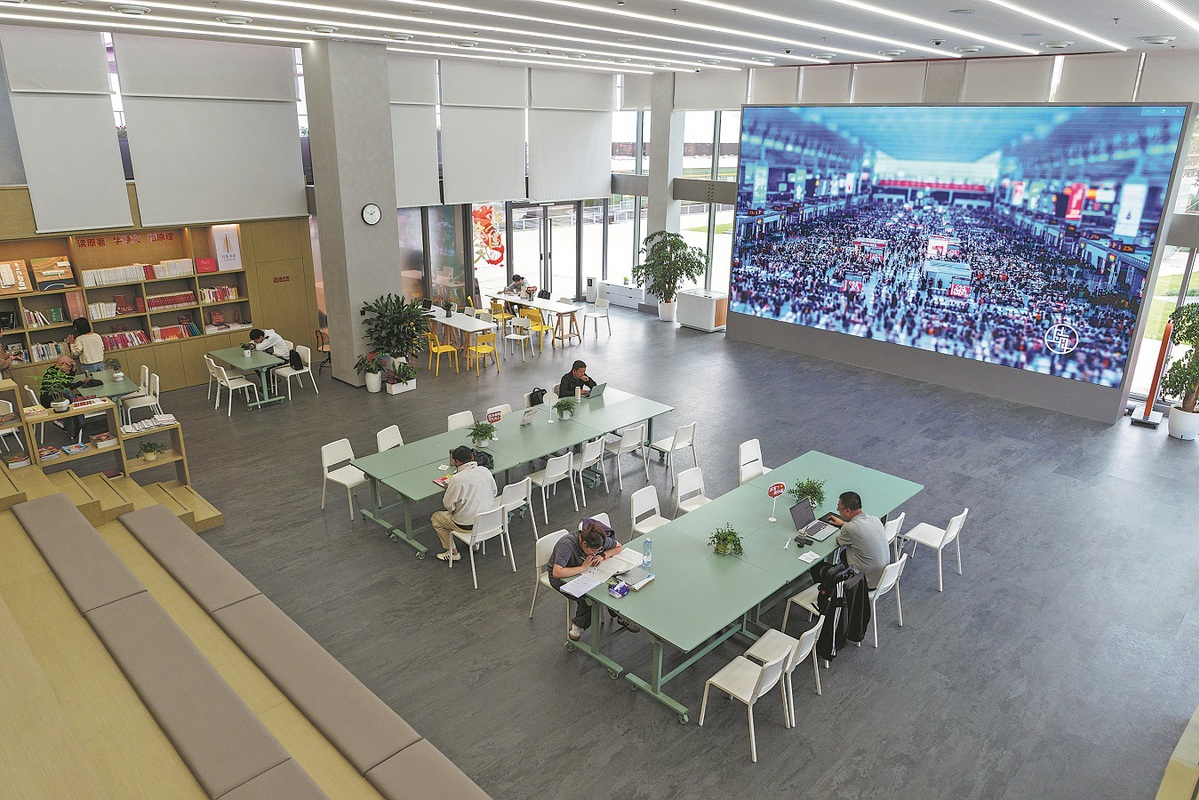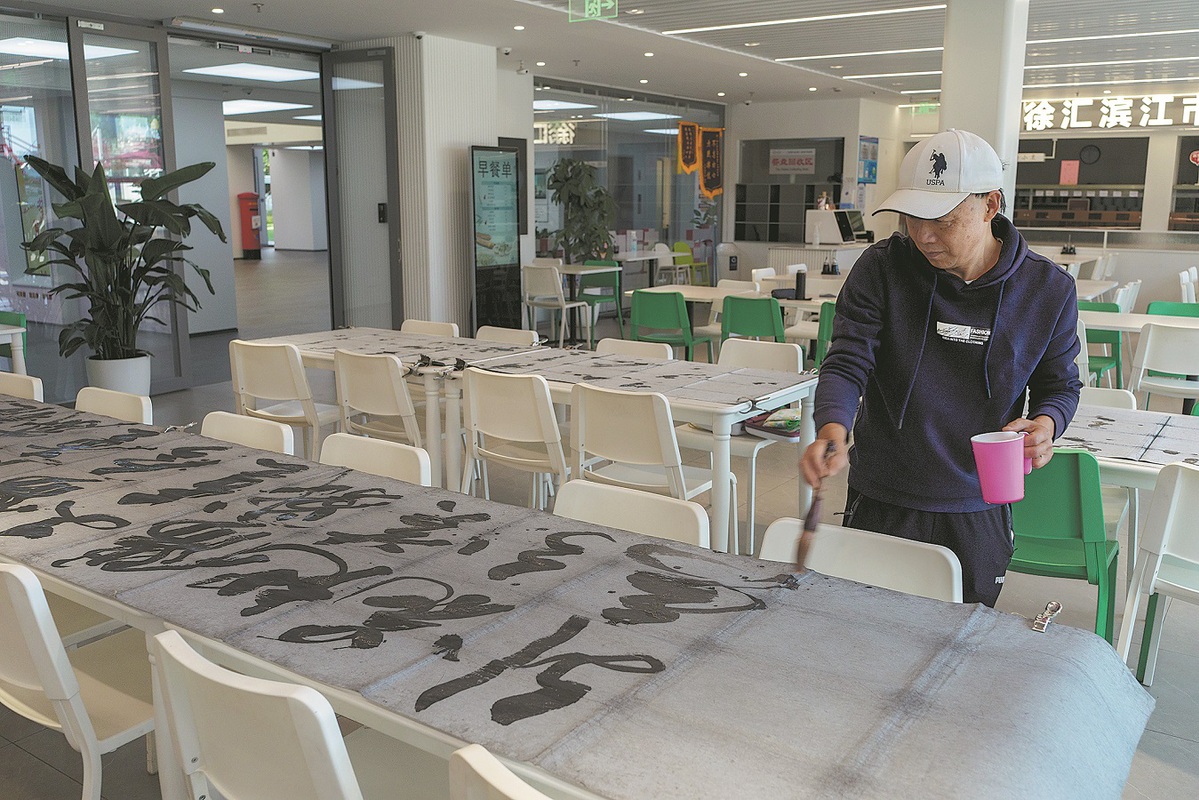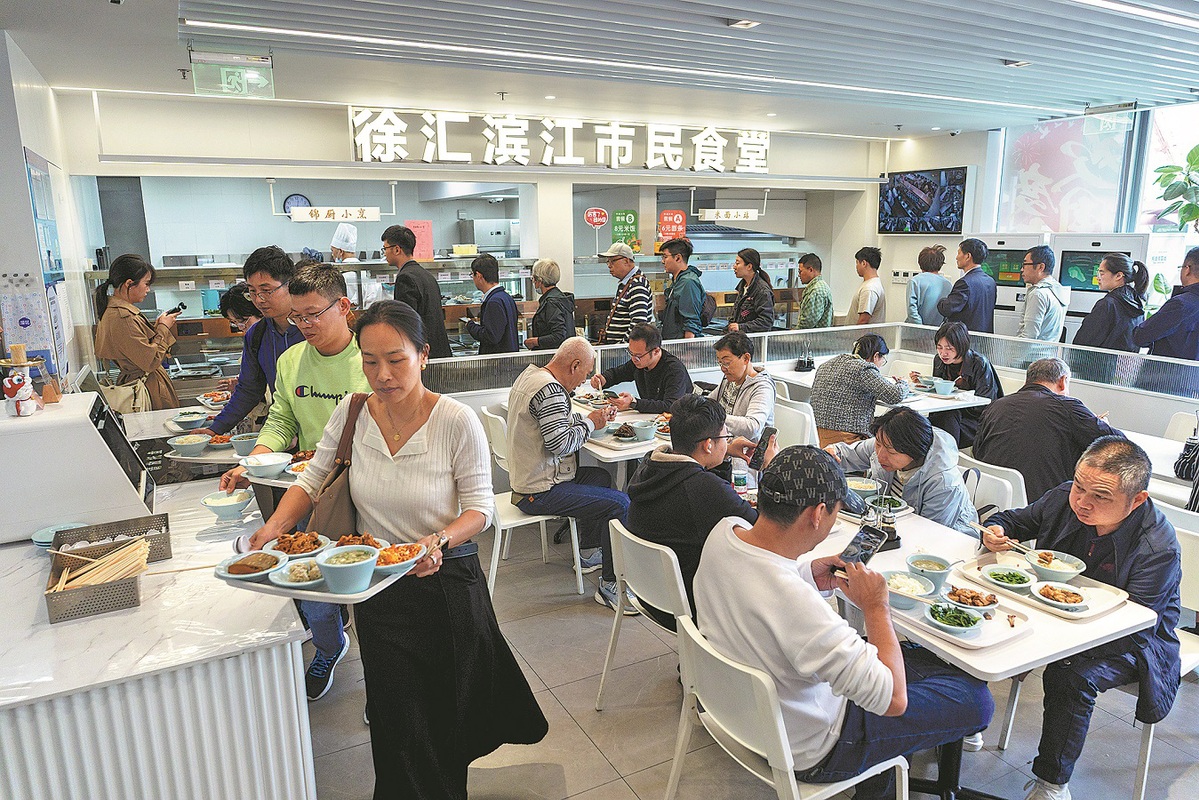今日上海
党群服务中心变身“全民客厅” - 2025年11月27日
Party-mass service centers turn into 'living rooms for all'
 People visit a riverside Party-mass service center in Xuhui district, Shanghai. A slogan reading "People's cities should be built by the people and for the people" is seen on a wall.
People visit a riverside Party-mass service center in Xuhui district, Shanghai. A slogan reading "People's cities should be built by the people and for the people" is seen on a wall. In 2021, the Party-mass service center at Xuhui riverside, a popular destination for weekend getaways in Shanghai, opened with a modest sign on the side placed to avoid deterring non-Party members.
Today, however, the sign is prominently displayed at the top of the two-story building, with the letters over 1-meter high.
The change to the display is indicative of the public's growing recognition and acceptance of the center. To date, it has received 2.6 million visits, with over 1 million visits recorded last year alone, averaging more than 2,700 per day. The steadily increasing number demonstrates the public's fondness for this public space.
"Aside from sleeping, I can fulfill nearly all my needs here. I come almost every day to practice calligraphy, join singing groups and perform sword dances. I love participating in the activities here," said Xu Xinmin, a 69-year-old resident and a veteran Party member.
"Seeing such spaces open to all residents is wonderful. They serve as a bridge between the Party and the public," he added.
Over the past two years, Shanghai residents have noticed an increase in Party-mass service facilities along city streets. They often offer community canteens, libraries, study spaces and services tailored to locals' needs, such as health services, senior care and playrooms for toddlers.
Initially used exclusively for Communist Party of China activities, these facilities have been transformed into "living rooms for all", with some even opening their doors all year round and providing around-the-clock services. Experts said that such a shift embodies the principle of "people's cities should be built by the people and for the people" proposed by President Xi Jinping, also general secretary of the Communist Party of China Central Committee.
"From day one of designing this facility on the riverside, which is now a 2,000-square-meter center, we kept the concept of 'people-centered'in mind. Therefore, we set operating hours from 7 am to 9 pm, open year-round, with some facilities like restrooms available around the clock. Shower facilities for riverside joggers are open from 6 am to midnight," said Xia Rui, head of Party-mass service facilities in Shanghai's Xuhui district.
Shanghai now boasts over 10,000 Party-mass service facilities of various sizes. Strategically located within 15-minute living circles, these facilities are part of a comprehensive service system, ensuring residents easy access to essential nearby services.
 A disabled elderly man requests a cover for his mobility scooter on a wishing card placed at the Tianping center.
A disabled elderly man requests a cover for his mobility scooter on a wishing card placed at the Tianping center.Name changes
The evolution of such facilities is encapsulated in their changing names.
Before 2015, they were Party member service centers, focusing on education and management for Party members. In 2015, they were renamed Party building service centers, and extended services to Party organizations. In 2019, all such facilities in Shanghai were rebranded Party-mass service centers, expanding their reach to the general public, and marking a leap in the scope and depth of services offered.
"The changes in the name reflect a return to our core service philosophy. We aim for such centers to be places where people feel welcome and turn to when they need help," said Xia.
This shift in philosophy is most directly reflected in the increased visibility and accessibility of these centers. Xuhui was the first district in Shanghai to require such centers to be set up prominently along streets, ensuring residents can easily see and access them as part of their daily routines, Xia said.
Xu Tong, director of Party and mass work in Xuhui's Tianping subdistrict, noted that the evolution of the centers' name reflects the government's intent to provide more services subtly and effectively, allowing residents to resolve issues when they go to community canteens, for instance, instead of needing to call hotlines.
The Tianping subdistrict Party-mass service center, which opened in September last year, incorporated community feedback into its decisions on the location selection, function design, and construction processes. The center included a community canteen and a baby-care room in response to residents' demands. These services have been extremely popular, said Xu.

Several of these facilities in the district have hosted domestic and international government delegations, said Xia, with visitors often impressed by the grassroots facilities and services available to the public.
Carlos Martinez, a British writer and political activist, who visited the Xuhui riverside center in October, said: "The Party-mass service center is a nice example of how the Party and the government here really try to pay attention to the needs of ordinary people, and there is something for the rest of the world to learn from. I think the Party and the government here are accountable to everybody."
The facilities are also home to various Party activities, including ceremonies for new Party members and oath renewals. They offer a variety of educational packages for Party members and organizations, such as stories about scientists and the city's urban development history.
Liu Chang is a worker at the Tianping center, once frequented by many important historical figures, including Soong Ching Ling, the wife of Chinese revolutionary leader Sun Yat-sen, Chen Yi, the first mayor of Shanghai after the founding of the People's Republic of China, and playwright Tian Han, who wrote the lyrics to the national anthem March of the Volunteers.
"Party organizations at the grassroots can book 'walking Party classes' at our center, where they can choose from six walking routes to explore themes around 'the red culture legacy' and 'a renewed Tianping', learning about local history and culture," Liu said.
 An elderly person with limited mobility asks for a commode chair on a wishing card displayed at the Gao'an center.
An elderly person with limited mobility asks for a commode chair on a wishing card displayed at the Gao'an center. Responding to needs
The riverside Party-mass service center has undergone two upgrades, both driven by public demand.
Xia explained that the restrooms within the facility were open around the clock from day one because they noticed visitors had difficulty finding restrooms.
Two years later, a canteen was opened in the center in response to the lack of dining options along the riverside. "We found many visitors at the riverside were using our center as a location to order food deliveries, so we decided to address the issue of meal accessibility," said Xia.
The canteen quickly became a hit, offering affordable meals with stunning river views. People lining up for meals often formed lines extending to the waterfront. This prompted an upgrade this year, when more than 150 seats indoors and outdoors were added. Also, there were special offers for delivery and sanitation workers nearby.
Lin Yiping, who has worked as an express delivery courier in Shanghai for four years, appreciates the community canteens, which solve his dining issues. "They give me a feeling that my contributions to the city are recognized," he said.
The Tianping center excels in its food services, offering a "you request, we cook" menu and meals with reduced salt and oil for seniors. It has also opened windows for quick public and business services, addressing residents' needs, such as dealing with disputes between neighbors and responding to requests about clothes recycling, property maintenance, and business needs, including registering for shop renovations and garbage disposal.

Xu Xinmin, a 69-year-old resident and a veteran Party member, practices calligraphy at the center on Oct 23.
As the facility is surrounded by eight schools, it has established a large library with 4,000 books and a children's activity area. In light of the aging population trend, the center also provides services, such as cognitive impairment screening, general medical consultations, haircuts, and allows the elderly to enjoy one-stop care close to home, said Liu.
Officials said these facilities provide services while avoiding harming existing small shops.
"One such center on South Shaanxi Road is located in an alley. Considering that there is already an eatery in the alley selling steamed buns, the center excluded them from its breakfast menu to avoid competing with small businesses," said Xu.
In Qingpu district's Huaxin town, known as China's No 1 town for express delivery, a dedicated Party-mass service center was opened in June to serve logistics workers and truck drivers. This two-story facility has over 20 areas suitable for activities such as relaxation, fitness, reading, traditional Chinese massage, and legal consultation.
The center currently receives roughly 200 visitors each week. Some couriers said that they like to go there for fitness activities and to play computer games to relax.
Liu Dongming, a truck driver, said that the opening of the center has eased many of his everyday inconveniences. "There are facilities for bathing and laundry here, as well as massage chairs that help relieve lower back pain. This is great and thoughtful," he said.
 People dine at the canteen of the riverside Party-mass service center.
People dine at the canteen of the riverside Party-mass service center. Shared city community
In Shanghai, Party-mass service centers have transcended their role as mere service points, becoming hubs for social cohesion and grassroots governance.
At the Tianping center, a wishing card area allows residents to express "small wishes", which are often fulfilled by anonymous donors, spreading goodwill throughout the community. A disabled elderly man, for example, hoped to get a cover for his mobility scooter, and another individual with limited mobility wished for a bedside commode chair.
During the Sept 3 military parade, over 100 residents gathered in front of a big screen at the riverside center to watch the live broadcast. "Some in the reading space joined as well when the national anthem played, demonstrating heartfelt patriotism in this shared public space," said Xia.
The Tianping center has integrated resources from nearby businesses, incorporating 150 establishments, such as noodle shops, bakeries, pastry stores, and barbershops, into a public service environment. This initiative offers discounts to seniors, low-income individuals, and people with disabilities, while also boosting the business of the small local shops.
Shi Hui, a teacher at the Shanghai Art and Design Academy, who used to view Party-mass service centers as activity venues for Party members, changed her mind after walking into a facility for the first time recently.
"Now I understand that they are for everyone, offering libraries and canteens at the best locations within the buildings. The transformation of the Xuhui riverside itself from an industrial belt in the past to a living belt today is a vivid expression of building a people-centered city as well," she said.
Source: China Daily
